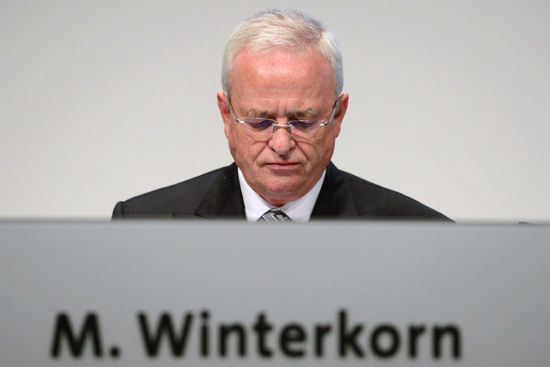VW ex-boss' role probed in scam
 0 Comment(s)
0 Comment(s) Print
Print E-mail Shanghai Daily, September 29, 2015
E-mail Shanghai Daily, September 29, 2015
 |
|
Former Volkswagen boss Martin Winterkorn. [File photo] |
German prosecutors yesterday launched an investigation into fraud allegations against former Volkswagen boss Martin Winterkorn over the carmaker's rigging of diesel emissions tests.
The German company also suspended three top engineers as it tried to get to grips with a scandal which has knocked more than a third off its market value, threatens to rock the global car industry and could damage Germany's economy.
Volkswagen has admitted cheating diesel emissions tests in the United States but Germany's transport minister says it also rigged tests in Europe, where it has much bigger sales, and it faces the worst business crisis in its 78-year history.
Underlining Germany's determination to find out who was responsible for a crisis that has tarnished the image of the country's industry on the world stage, the prosecutor's office said Winterkorn was being investigated over "allegations of fraud in the sale of cars with manipulated emissions data."
Winterkorn, who was replaced on Friday by company veteran Matthias Mueller, said when he quit last week that he was not aware of any wrongdoing on his part but wanted to give the company a new start. He also agreed to appoint a US law firm to conduct a full investigation.
In a further sign of Volkswagen's own efforts to tackle the crisis, sources familiar with the matter said the company had suspended Heinz-Jakob Neusser, the head of brand development at its core VW brand.
Also suspended were Ulrich Hackenberg, the head of research and development at premium brand Audi who oversees technical development across the group, and Wolfgang Hatz, R&D chief at sports-car brand Porsche who heads group engine and transmissions development, they said.
One source said Hackenberg was taking legal action. Volkswagen and Audi declined to comment, while the suspended executives could not immediately be reached.
A source close to Volkswagen's board said its executive committee would meet tomorrow to discuss the appointment of US law firm Jones Day to lead an external investigation.
Environmental campaign group Transport & Environment published new data yesterday showing that some new Mercedes, BMW and Peugeot cars use 50 percent more fuel than laboratory tests indicate, saying this was evidence of a wider industry problem.
T&E, which works closely with the European Commission, said its data did not prove other firms were using defeat devices.
But it said the gap between lab results and road performance had grown to such an extent for emissions of both carbon dioxide and nitrogen oxides that further investigation was needed to discover what carmakers were doing to mask emissions.
"The Volkswagen scandal was just the tip of the iceberg," said Greg Archer, clean vehicles manager at T&E, adding the gap between lab tests and real-world performance cost a driver 450 euros (US$504) a year.
ACEA, the European Automobile Manufacturers' Association, which represents top carmakers, has said there is no evidence the use of defeat devices is an industrywide issue. In a statement, it said it supported the development of updated testing. US and European regulators have said they are working on tighter rules.
Volkswagen shares have plunged about 35 percent since it admitted cheating US emissions tests, wiping more than 25 billion euros from its market value. It faces investigations and potential fines from regulators and prosecutors, as well as lawsuits from customers.
The crisis is an embarrassment for Germany, which has for years held up Volkswagen as a model of the country's engineering prowess and has lobbied against some tighter regulations on automakers. The German car industry employs more than 750,000 people and is a major source of income.
"The car industry is crucial for the German economy. It (the scandal) can have a big impact on the German economy. This should worry us a little," Deputy Finance Minister Jens Spahn told a conference.
The scandal has also rocked the wider car market, with manufacturers fearing a drop in diesel car sales and more costly regulations, and customers furious that Volkswagen has not given more details about what might happen to their cars.
The company has said 11 million cars worldwide had defeat devices installed. Audi said 2.1 million of these were its models, including the A1, A3, A4, A5, A6, TT, Q3 and Q5.






Go to Forum >>0 Comment(s)